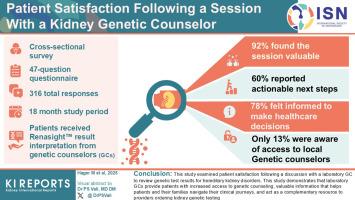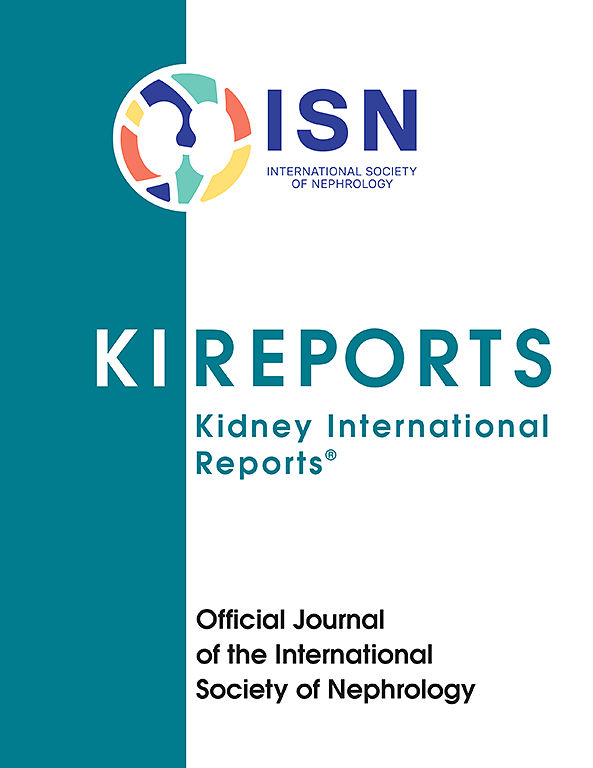Patient Satisfaction Following a Session With a Kidney Genetic Counselor
IF 5.7
2区 医学
Q1 UROLOGY & NEPHROLOGY
引用次数: 0
Abstract
Introduction
Genetic counseling’s impact on patients with kidney disease is understudied, despite 20% of adults with kidney disease having a monogenic cause. We sought to understand whether laboratory genetic counselors (GCs) provided a positive patient experience and increased access to genetic expertise.
Methods
A 47-question survey was developed and sent to patients following a genetic information session provided by laboratory GCs employed by a genetic testing company, to review genetic results from the RenasightTM test (a multigene hereditary kidney panel).
Results
Over 18 months, 316 responses were recorded. Overall, 92% of respondents (228/247) indicated that the genetic information session was valuable to them. Most respondents (60%, 145/244) felt they had actionable steps to take after the session, including: meeting with an extrarenal specialist for management related to the genetic diagnosis, family planning, seeing a local genetics provider, or sharing results with relatives. In addition, 78% of respondents (193/247) felt that they had sufficient information to make decisions about their health care following their session. Only 13% of patients (34/253) were aware of their access to a local GC if the genetic information session was unavailable.
Conclusion
This study examined patient satisfaction following a discussion with a laboratory GC to review genetic test results for hereditary kidney disorders. This study demonstrates that laboratory GCs provide patients with increased access to genetic counseling, valuable information that helps patients and their families navigate their clinical journeys, and act as a complementary resource to providers ordering kidney genetic testing.

肾脏遗传咨询师治疗后的患者满意度
遗传咨询对肾病患者的影响尚未得到充分研究,尽管20%的成人肾病患者有单基因病因。我们试图了解实验室遗传咨询师(GCs)是否提供了积极的患者体验并增加了获得遗传专业知识的机会。方法在基因检测公司的实验室GCs提供遗传信息后,向患者发送了一份包含47个问题的调查问卷,以审查RenasightTM测试(一种多基因遗传性肾脏面板)的遗传结果。结果在18个月内,记录了316例应答。总体而言,92%的受访者(228/247)表示遗传信息会议对他们有价值。大多数受访者(60%,145/244)认为他们在会议结束后可以采取可操作的步骤,包括:与外部专家会面,进行与基因诊断相关的管理,计划生育,与当地遗传学提供者会面,或与亲属分享结果。此外,78%的答复者(193/247)认为,他们掌握了足够的信息,可以在会议结束后就其保健作出决定。如果遗传信息会话不可用,只有13%的患者(34/253)知道他们访问了本地GC。结论:本研究通过实验室GC检查遗传性肾脏疾病的基因检测结果,检测患者的满意度。本研究表明,实验室GCs为患者提供了更多的遗传咨询机会,为患者及其家属提供了有价值的信息,帮助他们进行临床治疗,并作为订购肾脏基因检测的提供者的补充资源。
本文章由计算机程序翻译,如有差异,请以英文原文为准。
求助全文
约1分钟内获得全文
求助全文
来源期刊

Kidney International Reports
Medicine-Nephrology
CiteScore
7.70
自引率
3.30%
发文量
1578
审稿时长
8 weeks
期刊介绍:
Kidney International Reports, an official journal of the International Society of Nephrology, is a peer-reviewed, open access journal devoted to the publication of leading research and developments related to kidney disease. With the primary aim of contributing to improved care of patients with kidney disease, the journal will publish original clinical and select translational articles and educational content related to the pathogenesis, evaluation and management of acute and chronic kidney disease, end stage renal disease (including transplantation), acid-base, fluid and electrolyte disturbances and hypertension. Of particular interest are submissions related to clinical trials, epidemiology, systematic reviews (including meta-analyses) and outcomes research. The journal will also provide a platform for wider dissemination of national and regional guidelines as well as consensus meeting reports.
 求助内容:
求助内容: 应助结果提醒方式:
应助结果提醒方式:


